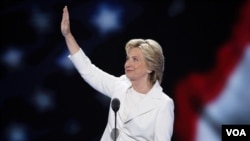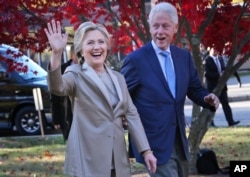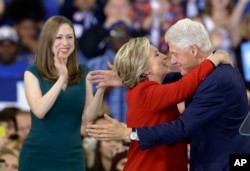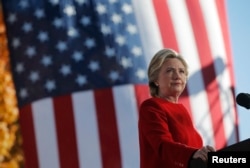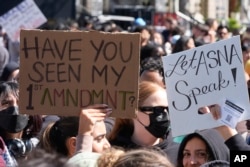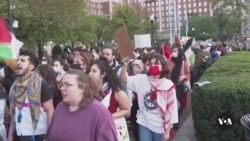Student Union
Clinton Fails to Win Seat As First Female President of US
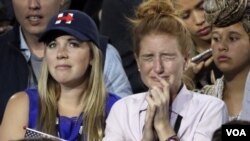
In the days before Tuesday's election, a wide range of national polls gave her a slight edge over Donald Trump. She had the type of political experience that historically has been a path to the White House.
When voters had their chance to have their say at the polls, Clinton lost in her bid to become the first woman elected president of the United States.
Supporters watch the election results during Democratic presidential nominee Hillary Clinton's election night rally in the Jacob Javits Center glass enclosed lobby in New York, Nov. 8, 2016.
Clinton's campaign chief John Podesta told supporters at her rally in New York City to go home at 2 a.m. Wednesday, before the race had been officially called, saying votes were still being counted and that there would be more to say later in the day.'So proud of you'
"I want every person in this hall to know and every person across the country who supported Hillary to know that your voices and your enthusiasm mean so much to her and to [running mate Tim Kaine] and to all of us. We are so proud of you and we are so proud of her," Podesta said.
Clinton was not there.
The rally was at the Jacob Javits Convention Center, a venue that featured the imagery of its vast glass ceiling and what a Clinton win would symbolize.
Clinton supporters went from jubilant Tuesday evening after the playing of the national anthem to slowly accepting the reality of what was happening as the night went on.
Democratic presidential candidate Hillary Clinton, and her husband former President Bill Clinton, greet supporters after voting in Chappaqua, N.Y., Nov. 8, 2016.
VOA's Ramon Taylor said there were glimmers of hope from the crowd during the night, such as when the state of Virginia was called for Clinton, but that those died out quickly, even as the thumping, upbeat soundtrack of Katy Perry and Bruno Mars played on.After midnight, with the math for a possible Clinton win looking more and more difficult, some people started filing out and none were in the mood to talk to reporters.
'I'm with her!'
A similar scene unfolded at a bar in Philadelphia, where Clinton supporters chanted "I'm with her!" early on and became silent as more and more states went to Trump.
VOA's Katherine Gypson said the crowd appeared stunned as the restaurant closed for the night.
Clinton's campaign massively outspent Trump's and had a big advantage when it came to workers and volunteers mobilized to convince voters in states across the country, both of which helped fuel the predictions that she would defeat Trump.
Democratic presidential candidate Hillary Clinton hugs her husband, former President Bill Clinton as their daughter Chelsea Clinton looks on during a campaign rally in Raleigh, N.C., Nov. 8, 2016.
But Clinton also dealt with widespread unpopularity among voters, with polls showing that a majority did not find her trustworthy. Questions about her use of a private email system when she was secretary of state never went away, persisting in debates, Trump's rallies and media reports through the final week of campaigning.Couldn't dispel concerns
Irfan Nooruddin, a professor of politics at Georgetown University, said Clinton and her team tried to dispel those concerns, but ultimately could not.
"I think what we've seen tonight is that for a lot of voters, that baggage of Clinton was just too much to overcome," Nooruddin told VOA.
He said animosity toward Clinton pushed white, rural voters to vote in ways unseen before, and that she was less successful than she had hoped in carrying the young people and African Americans who helped elect President Barack Obama.
Democratic presidential nominee Hillary Clinton speaks at a campaign rally in Pittsburgh, Pennsylvania, Nov. 7, 2016, the final day of campaigning before the election.
Clinton served as secretary of state during Obama's first term, and Republicans, including Trump, often portrayed her candidacy as a run for a third term of the Obama administration.
David Schultz, a political science professor at Hamline University, said the 2016 vote reminded him of the 1980 election in which a lot of voters who made up their minds in the final days of the race voted for challenger Ronald Reagan over incumbent President Jimmy Carter.
"Here I sort of think of Clinton as the incumbent, that is same party as Obama, and there seems to be evidence voters are breaking away from the incumbent towards the challenger because they don’t like the direction that the country is going," Schultz said.
Support of women
Clinton had an advantage when it came to support from female voters, but Trump always had more support among men throughout the race, particularly whites.
Schultz said sexism is part of the story of this election.
"There is I think still a large percentage of our population that won't vote for a woman for president of the United States. Exactly what it is, I don't know. I don't think the polls are reflecting that either," he said.
See all News Updates of the Day
- By VOA News
Studying STEM? International students have funding options

US News & World Report takes a look at funding options for international students pursuing STEM degrees in the U.S.
The article explains the different kinds of scholarships and grants and offers tips on getting part-time jobs and private student loans. Read the full story here. (March 2024)
- By Robin Guess
US campuses are battlegrounds in free speech debate

This week the University of Southern California canceled the graduation speech of its senior class valedictorian at a time when there is a growing debate over the limits of free speech on American college campuses.
USC’s Asna Tabassum, a Muslim biomedical engineer major, was selected from among 100 outstanding students to address the graduating class of 2024 this May. However, the school withdrew the invitation for her to speak at the graduation ceremony citing safety concerns.
Tabassum denounced the decision, which she attributed to her public support for Palestinian human rights. She said it is part of “a campaign of hate meant to silence my voice.”
The school maintains it is a safety issue, not about free speech. School officials say they received an alarming number of violent threats after selecting her as speaker.
USC is one of many American universities that have struggled with policies over free speech and campus protest since October’s Hamas terrorist attack on Israel and the continuing fighting in Gaza. After weeks or months of on-campus protests and rallies, schools have been taking more forceful action to punish protesters who administrators say have become disruptive.
On Thursday at Columbia University in New York, police arrested more than 100 students who had gathered on campus for pro-Palestinian protests. The school’s dean wrote that the protesters had been told several times that they were violating university policies and would be suspended. The students say they were exercising their free speech rights.
At Washington’s American University, protests in all campus buildings have been banned by the school’s president since January. Under the new policy, students may not hold rallies, engage in silent protests or place posters in any campus building.
Protests and safety
University students have a long history of engaging in political activism. From the Vietnam War to abortion rights, universities have played a key role in American political debates.
However, students now say that schools like AU with a long-standing protest culture are silencing protesters with new rules.
Arusa Islam, American University student body president-elect and current vice president, says the policies are preventing an open discussion about U.S. foreign policy.
“Indoor protesting was never a problem, it was never an issue before October 7th,” Islam said. “Students were allowed to put up posters in buildings and students were allowed to have a silent protest.”
“And now we don’t have that right anymore,” she added. “We have been silenced and it is affecting us greatly.”
American University’s president, Sylvia Burwell, says the school’s new policies are intended to ensure that protests do not disrupt university activity.
Burwell also referred to recent events on campus that “made Jewish students feel unsafe and unwelcome.” She added, antisemitism is abhorrent, wrong, and will not be tolerated at American University.
While administrators insist that they are making narrow restrictions in the interests of providing an education, critics say the policies have a far-reaching effect.
At Cornell University, where new rules took effect in January, Claire Ting, the executive vice president of the Cornell Student Assembly, said the policies have had an unsettling effect on campus.
“The campus climate at Cornell has been tense surrounding free speech in recent times,” Ting emailed VOA.
Ting said that both students and faculty feel the policy has had chilling effects on free expression.
“Students report facing arbitrary, escalating punishment for violating the policy, with the policy itself lacking clear outlines for the consequences of civil disobedience,” she added.
In its new policy Cornell warns students that disciplinary action may be taken if protests impede people or traffic, damage school property or interfere with the school’s operations in any way.
In its campus-wide notice explaining the new guidelines, the school wrote that the new policy would ensure that expressive activity is allowed but must remain nonviolent.
The Foundation for Individual Rights in Education, also known as FIRE, has tracked free speech issues on American campuses.
FIRE and College Pulse have produced an annual survey, since 2022, ranking colleges based on their policies and what students say about the free speech climate on campus.
This year the group reported that “alarming” numbers of students say they self-censor or “find their administrations unclear” on free speech issues.
“College campuses have always been places where students have been unafraid to express themselves and with the recent Gaza conflict after the 10/7 attacks, it’s been very heated on both sides of this issue,” said Zach Greenberg, the senior program officer of FIRE.
Harvard ranked last in this year’s survey. FIRE said the school punished some professors and researchers over what they had said or written, and students reported a poor climate for free speech on campus.
The controversy came to Congress late last year, when Harvard’s president testified over complaints of widespread antisemitism.
“I don’t think you’d find many students on campus right now that would say we are the model for flourishing free speech and ideas exchange in the country,” said J. Sellers Hill, president of Harvard’s school newspaper The Harvard Crimson.
“But I think you’ve really seen that be acknowledged by administrators and it seems to be something they are dedicated to taking on.”
As the head of The Harvard Crimson, Hill manages the paper’s 350 editors and 90 reporters, who’ve covered, in detail, the ongoing free speech/protests controversy and the resignation of former President Claudine Gay following her testimony to Congress.
“I think no one would dispute Harvard has work to do and progress to make,” Hill said. “I think it’s a tough sell, for me, that Harvard is uniquely in its own league in terms of intolerance of speech. That doesn’t square with what I have seen on our college campus or on other college campuses around the country. I think Harvard is held to a higher standard.”
Proposed settlement offered over financial aid allegations
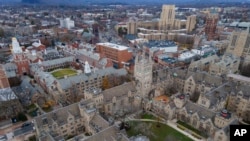
A group of U.S. colleges and universities have agreed to settle a lawsuit alleging deceptive financial aid tactics, according to a report published in The Hill.
The schools would pay $284 million to plaintiffs who were enrolled full-time and received financial aid between 2003 and 2024.
The schools have denied the allegations. (April 2024)
Universities in Middle East building research relationships with China

As China bolsters research relationships with universities in the Middle East, the United States has taken notice – especially when that research involves artificial intelligence.
Reporting for University World News, Yojana Sharma has the story. (March 2024)
Tips for staying safe while studying in the US
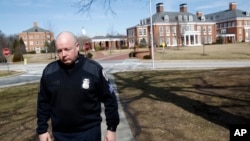
Recent news events have raised safety concerns among some international students studying in the United States.
Adarsh Khandelwal, writing in the India Times, has tips for staying safe from the moment you arrive until the day you complete your studies. (March 2024)




